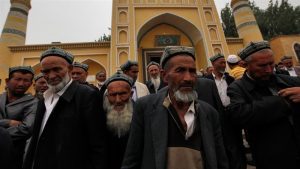Beijing says new rules are necessary to fight ‘extremism’ but rights groups have called similar restrictions repressive.

Many Uighurs have complained of cultural and religious repression and discrimination by China, an accusation Beijing has denied [How Hwee Young/EPA]
China has banned “abnormal” beards and full-face coverings in the remote western region of Xinjiang as part of tighter “anti-extremism” regulations that also prohibit rejecting state media.
Xinjiang is home to about 10 million Uighur Muslims, who have said they routinely face discrimination.
Hundreds of people have died in recent years in the region due to unrest blamed by Beijing on “separatists”, though rights groups say the violence is more a reaction to repressive Chinese policies.
The new legislation took effect on Saturday and lists a wide range of restrictions, including rejecting or refusing “radio, television or other public facilities and services”, marrying using religious rather than legal procedures and “using the name of Halal to meddle in secular life of others”.
The rules also ban not allowing children to attend government schools, not abiding by family planning policies, wearing robes that cover the whole body and face and “abnormal growing of beards and naming of children to exaggerate religious fervour”, according to the text of the rules published on a government website.
It did not clarify how the rules would be enforced.
Many Uighurs complain of cultural and religious repression and discrimination by China. Beijing has denied the accusations.
A number of similar regulations had previously been introduced in some places in Xinjiang, including stopping people with headscarves, veils and long beards from boarding buses in at least one city. The new rules, however, expand the list and formally apply them to the entire region.
The popularity of veils for Uighur women, in particular, has grown in recent years in what experts say is an expression of opposition to Chinese controls.
China has said Xinjiang faces a grave separatist threat from Uighur fighters allegedly linked to al-Qaeda and the Islamic State of Iraq and the Levant (ISIL, also known as ISIS), prompting the government to ramp up surveillance measures and police patrols. The government has provided little evidence for such claims.
ISIL released a video in late February purportedly showing Uighur fighters training in Iraq and vowing to strike China, according to the SITE Intelligence Group.
Earlier this month, Chinese President Xi Jinping called for a “great wall of iron” to safeguard Xinjiang, referencing the military response following the pro-democracy protest in Tiananmen Square in 1989.
Rights groups have said that Chinese religious restrictions on Muslims may have driven more than 100 to join ISIL.




 Print
Print Email
Email